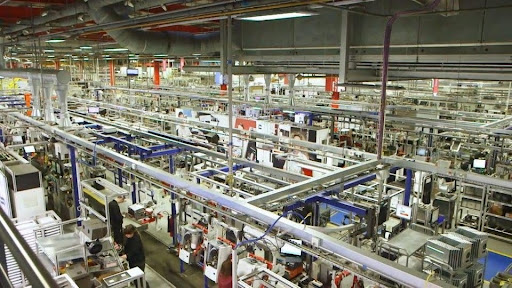Manufacturing facilities aiming to modernize often seek external expertise. Distributors and system integrators play crucial roles in identifying what is needed to boost productivity.
At HESCO, we serve as a distributor. We collaborate with numerous system integrators who help to install and program these machines.
Understanding the distinction between a distributor and a system integrator is essential, as both are crucial parts of automating your facility.
Let’s dive into the differences between the two, and which could be a better fit for you to reach out to right now.
What is a Distributor in Industrial Automation?
In industrial automation, distributors act as a primary point of sale. If you need a new part for your machine, you come to us. As a distributor, we are responsible for providing you with product knowledge and training. We manage financial transactions and serve as the backbone of product support.
Distributors typically handle smaller-scale projects when working with the customer. If a part needs a replacement, contacting your distributor will get you what you need promptly.
For instance, let’s say you are looking to update the PLC you currently have installed. It is not working as efficiently as it was when you updated your facility 10 years ago. There seem to be some programming issues that are affecting its performance.
To swiftly replace the outdated PLC, you contact your local distributor. You want to ensure that you are purchasing the correct product and any necessary add-ons.
The distributor informs you that the PLC is the sole purchase required, and you place the order. When it arrives, your prior knowledge of the existing PLC and associated software allows you to install and program the PLC effectively.
You’re back up and running in no time, better than before.
Think of a distributor as an automotive shop, like AutoZone or O’Reilly’s. When your car breaks down and you have the knowledge or know someone who knows how to install the part for you, you can simply go directly to that store and purchase the product needed. If you need guidance as to what part is best, the workers there can help you.
Distributors are very similar. They are the primary point of purchase for you and can provide guidance.
But, if you lack previous experience or need additional programming, then a system integrator could be the more suitable option.
What is a System Integrator in Industrial Automation?
Differing from a distributor, system integrators are responsible for making industrial automation equipment functional for your facility. They take various parts and components, program them, and ensure that the solutions provided meet your specific needs.
System integrators often handle larger-scale projects. If an entire facility or production line needs to be updated, a system integrator can assist.
Instead of merely replacing your PLC, let’s say you need to completely modernize your entire facility’s machinery. The machines are from the 1980s and though they still operate, they do not operate efficiently.
So, you contact a system integrator because after researching, you determine they can help determine exactly what is needed to update your facility and install the products.
You inform the system integrator of your need for a complete facility revamp. Your production is suffering due to outdated machinery, and you lack in-house expertise in programming and installation, prompting you to invest in full integration.
Since this is such a large-scale project, the most logical next step is investing in a system integrator. After assessing your needs, the system integrator works with the local distributor to order the necessary parts and proceeds with installation once everything is readily available.
System integrators are sort of like mechanics. When your car is broken, you bring it to the shop. They diagnose the issue, order the parts, install them, and provide services after maintenance.
System integrators do the same – assess what you need, order the components through the distributor, install them, and provide maintenance after installation.
Price
Price always plays an enormous role in making any large purchase. Distributors and system integrators differ greatly in price.
When purchasing a part directly from a distributor, you pay for the part plus shipping. There is no additional cost for using a distributor unless you invest in a service they provide.
When utilizing a system integrator, the price varies based on the size of the project. It can cost you as little as $5,000 and could go up to $500,000 plus for larger-scale projects. This includes the parts, labor, installation, design, programming, and maintenance.
There is not one set price – depending on your needs, the price differs.
Are Both Distributors and System Integrators Necessary?
After comparing the two roles, it is evident that both are crucial for fully automating a facility.
For updating one or two parts, a system integrator may not be necessary. Though it is never discouraged to utilize a system integrator for those small updates, they are more useful for updating a full facility – if there are one or two parts that need to be purchased or replaced, your local distributor has the knowledge to assist you.
For a full facility update, we strongly recommend using a system integrator. The system integrator will then utilize a distributor to acquire parts and complete the installation.
Distributors are vital for keeping both end-users and integrators informed about the latest technologies and products. System integrators are essential for correctly programming parts to perform the required tasks.
Getting Ahead of Industrial Automation
As you evaluate the status of your facility’s automation performance, assess whether you have the necessary tools. Reaching out to a distributor or a system integrator is an excellent starting point.
If you are unsure of how to begin, contact us today!

